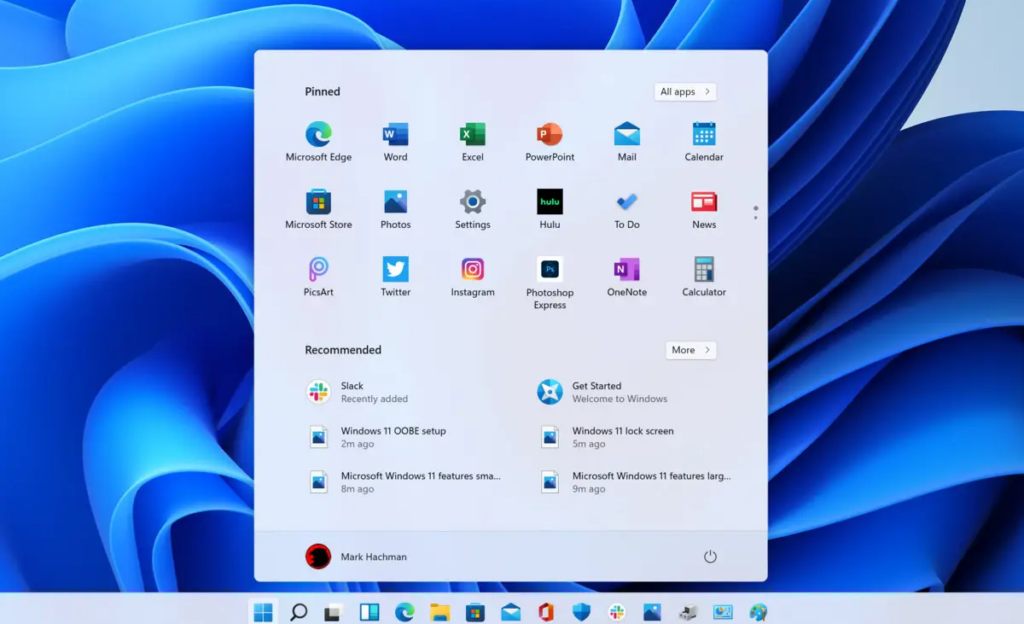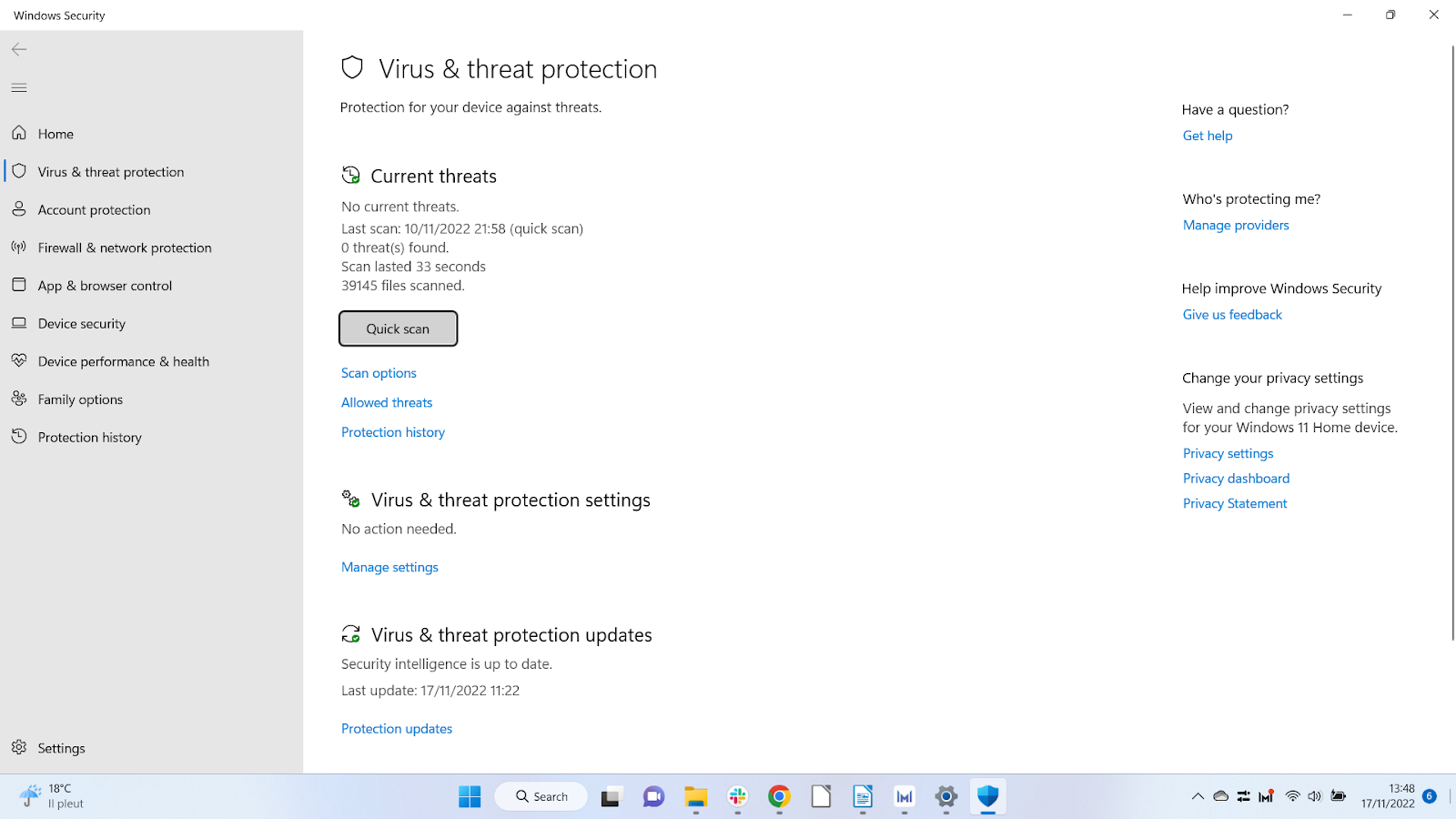Released in October 2021, Windows 11 burst onto the scene with much fanfare. The interface received a much-needed overhaul and provided us with a better, more streamlined user experience. We were also treated to plenty of new widgets, apps, and finally, the ability to integrate with our Android smartphone devices.

Windows 10 came with “Windows Defender” preinstalled, which is Microsoft’s antivirus offering. However, it was found to be somewhat basic and not up to the task of providing full protection against malware threats.
So, when Windows 11 arrived, everyone was eager to know if they could finally do away with their paid antivirus subscriptions.
Microsoft claims that Windows 11 is the most secure version of its operating system yet but is this the case? Before you hit cancel on your antivirus protection, let’s take a look at how good the antivirus software on Windows 11 really is.
TL;DR: Microsoft Defender is adequate antivirus software for the average user. However, it lacks the additional features of paid third-party antivirus protection. Therefore, if a strong antivirus and other protection features are important to you, you will benefit from purchasing additional protection.
Let’s get into what Microsoft’s antivirus is and what it does so you can make an informed decision about whether or not you need additional antivirus software.
Do I Need Antivirus for Windows 11?
Technically, you don’t need an additional antivirus for Windows 11 (or Windows 10) because it comes with its own antivirus software already installed.
Microsoft Defender is Microsoft’s own antivirus software, and it has actually been around in previous iterations of Windows for quite some time. If you’re wondering why you don’t recognize that term, it used to be called “Windows Defender.”
Along with the name change, Microsoft has ramped up its security offering for Windows 11, and it now does an okay job of detecting malware and blocking attacks.
With that said, it still doesn’t do everything that a paid service can do, and you may be left lacking in some areas (more on that later).
But, if you are a long-time user of free third-party antivirus software and you’re only interested in basic protection, Microsoft Defender is adequate.
What Does Microsoft Defender Do?
Microsoft Defender does what you’d expect any half-decent antivirus software to do. It detects and blocks malware and other malicious attacks and threats.
The system performs automatic scans; however, you can manually scan whenever you like and choose between:
- Quick scan
- Full scan
- Customized scan (choose specific files and areas to check)
- Microsoft Defender Antivirus (offline scan)
The last option uses up-to-date threat definitions and is specifically designed to seek out malicious software that is known to be hard to remove. Performing this scan will require a system restart, while the other types of scans can run in the background.

You also have some nice additional features. For example, the parental controls allow you to:
- Set time limits
- Limit browsing options
- Track location
- Filter content

To keep your device running optimally, you can perform a basic health check, and if any problems are detected, you can troubleshoot and fix them.
Which Threats Does Microsoft Defender Protect My Device From?
You can expect Microsoft Defender to protect against the following threats:
- Viruses
- Ransomware
- Trojans
- Malicious files and download links
- Phishing sites
- Malicious sites
- Network attacks and exploits
Does Microsoft Defender Work on All Types of Devices?
Microsoft Defender will only work on devices that run Windows 10 or 11.
Unfortunately, you cannot connect multiple devices to Microsoft Defender or run it on non-Microsoft hardware or older versions of Windows.
Is Microsoft Defender Good Enough?
While Microsoft Defender makes for a good basic antivirus, it’s been widely reported that its Malware detection rates fall short compared to other established antivirus providers.
And despite the sleek new user interface of Windows 11, I found I had to go searching for the various antivirus and protection tools since it’s not immediately obvious where they are.
The health check function is a nice feature, but it lacks the tools to perform a full system cleanup, and you have no option where you can boost the system performance.
One extremely irritating issue I encountered was that when I switched on the parental controls, it essentially blocked every single browser from working, with the exception of Microsoft Edge.
Like every other person on this planet, we use Chrome, and to enable it to work, I had to go into the settings and manually unblock it. The same goes for Firefox and all other non-Microsoft applications.
Lastly, when comparing Microsoft Defender to third-party antivirus, I found it seriously lacked the extra features that are becoming commonplace with paid antivirus subscriptions.
For example, Microsoft Defender does not include a VPN, identity theft protection, or a password manager.
Do I Need a Third-Party Antivirus for Windows 11?
So, the ultimate question is, do you really need third-party antivirus software for Windows 11 with Windows Defender running?
Well yes. But also no.
If you are the sole user of your device, don’t explore the internet beyond well-known sites, and know better than to click on dodgy links and files, then Microsoft Defender is probably enough protection for you.
However, if you want any of the following, you will still benefit greatly from a third-party antivirus product:
- Parental controls without blocking Chrome and other browsers
- The ability to connect multiple devices to one antivirus account
- A high and reliable level of threat protection
- Identity theft protection
- A virtual private network (VPN)
- A password manager
- System cleanup capabilities
- A system performance booster
- Dark web monitoring
- Anti-theft protection
The Best Antivirus Software for Windows 11
If you’ve decided that you will benefit from additional antivirus software, you’re probably now wondering which offers the best value and protection.
It’s true, there’s a staggering number of antivirus providers out there but fear not. I have already rounded up the best ones on offer.
My top three favorites for 2025 are:
1. Bitdefender
BitDefender has some really comprehensive all-in-one plans that contain everything you need for a fully protected device and browsing experience.
As well as an extremely high level of protection, you also get a VPN, identity theft protection, device optimizer, parental control, and more.
The premium plans also have bank transaction and card protection and 401K protection.
Best of all, each plan allows you to use BitDefender with up to ten devices which is usually plenty for the average family.
Plans are available from $59.99/year, and you can take advantage of a 30-day free trial.
Don't miss out on this opportunity for comprehensive, all-in-one digital protection. With Bitdefender, you get top-notch security, a VPN, identity theft protection, device optimizer, parental control, and so much more. Act now and save 60% on your first year. Your digital life deserves premium protection.
2. Norton360
Norton has been around for decades and has some excellent all-in-one plans at very reasonable prices. You can choose to cover between 5, 10, or even unlimited devices, including a generous amount of cloud backup storage.
Plus, you have parental controls, a school time feature (to keep kids focused during online learning sessions), webcam safety, identity theft protection, bank and card fraud protection, plus a VPN and privacy monitor.
To top it all off, Norton has a 100% virus protection promise.
Plans are from $49.99/year and you can try it out for free for 7 days.
3. Kaspersky
Kaspersky’s premium plans are all-encompassing, plus they come with a year of Safekids for free. This is a full parental control package that allows your children to safely browse the internet and monitor their activity.
You can also enjoy identity protection, a VPN, full system cleaning and optimization, and remote system support whenever you need help.
Plans start from $19.99/year, along with a 30-day money-back guarantee.
You can read the full roundup of the best antivirus software providers here.
Our Verdict ⭐
Microsoft’s antivirus offering is okay, and the tech giant has started to make strides in providing adequate protection for its users. However, it still falls short where threat protection rates and features are concerned.
Also, the lack of versatility of Microsoft Defender will be frustrating to many. We all use and need protection for multiple devices, so the fact you can only use it for Windows devices is very limiting.
It remains to be seen if Microsoft will continue to improve its antivirus offering. Windows 11 is still relatively new, so maybe we can look forward to future developments.
In the meantime, there are some really excellent third-party antivirus software providers on the market, all at reasonable prices. So, if you don’t want to put up with the limitations that come with Microsoft Defender, I recommend giving one a go.
Don't miss out on this opportunity for comprehensive, all-in-one digital protection. With Bitdefender, you get top-notch security, a VPN, identity theft protection, device optimizer, parental control, and so much more. Act now and save 60% on your first year. Your digital life deserves premium protection.
How We Test Antivirus Software: Our Methodology
Our antivirus and antimalware recommendations are based on real testing of the protection, user-friendliness, and minimal system impact, providing clear, practical advice for choosing the right antivirus software.
- Purchasing and Installing: We start by buying the antivirus software, just like any customer would. We then install it on our systems to assess the ease of installation and initial setup. This real-world approach helps us understand the user experience from the get-go.
- Real-World Phishing Defense: Our evaluation includes testing each program’s ability to detect and block phishing attempts. We interact with suspicious emails and links to see how effectively the software protects against these common threats.
- Usability Assessment: An antivirus should be user-friendly. We rate each software based on its interface, ease of navigation, and the clarity of its alerts and instructions.
- Feature Examination: We scrutinize additional features offered, especially in paid versions. This includes analyzing the value of extras like parental controls and VPNs, comparing them against the utility of free versions.
- System Impact Analysis: We measure the impact of each antivirus on system performance. It’s crucial that the software runs smoothly and doesn’t noticeably slow down everyday computer operations.
Learn more about our review methodology.
References:

